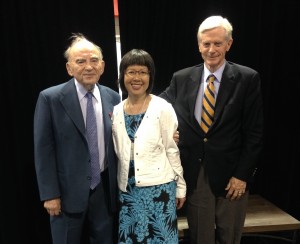Forced Organ Harvesting in China, 2015 Update
Left to Right: Sir Alex Polowin (moderator), Hon. David Kilgour (guest speaker), Dr. Maria Cheung (guest speaker) at the Forced Organ Harvesting forum at Congress 2015 for the Humanities and Social Sciences.
From May 30 to June 2, the Plum Blossom Centre (PBC) operated an exhibition booth at Congress 2015 of the Humanities and Social Sciences, in Ottawa University, Ontario. On June 5, PBC invited Hon. David Kilgour and Dr. Maria Cheung (University of Manitoba) to speak at the forum, “The Persecution of Falun Gong and the Issue of Forced Organ Harvesting in China: Why We Have to Care.”
At the forum, Hon. David Kilgour described “the covert large-scale seizure of Falun Gong organs for commercial transplantation purposes” as a “highly profitable feature of this persecution.” Today, despite overwhelming evidence researchers and investigators around the world have uncovered to verify the existence of the inhumane practice, China continues to deny the pillaging of organs from Falun Gong and other prisoners of conscience (such as Uighurs, Tibetans and House Christians).
On February 3, 2015, the Canadian House of Commons’ all-party subcommittee on International Human Rights released a statement calling for an end of organ pillaging due to their concern over “credible allegations that prisoners of conscience and members of religious and ethnic minority groups, including but not limited to practitioners of Falun Dafa and Uyghur’s, in the People’s Republic of China are being executed for the purposes of harvesting and transplanting their organs.”
Dr. Maria Cheung explicated the years of investigation that has identified the chain of operation in this organ harvesting business led by the Chinese Communist Party. Dr. Cheung also contextualized China’s forced organ harvesting within the continuing persecution of Falun Gong that dates back to 1999.
In 2014, award-winning China analyst and investigative journalist, Ethan Gutmann, published his latest book, The Slaughter: Mass Killings, Organ Harvesting, and China’s Secret Solution to its Dissident Problem. Despite being based in London, England, China issues is far from foreign to Gutmann. His writings on China have been widely published, and his testimonies have been heard before the U.S. Congress, European Parliament and the United Nations.
The Slaughter marks the end of a seven-year investigation, during which Gutmann finds new evidence by interviewing over 100 witnesses including prisoners of conscience survivors, doctors, policemen and camp administrators from China. Gutmann’s research estimates that over 65, 000 Falun Gong practitioners and 2000 Uighyurs, Tibetans and House Christians were killed for their organs within state systems in China from 2000 to 2008. Gutmann also found that the organ removal procedures are done while the victims are still alive.
Gutmann tells Vice that The Slaughter is a comprehensively researched work, framing forced organ harvesting within a history of persecuting prisoners of conscience. The book conclusively demonstrates that prisoners of conscience have been targeted for their organs since 1997 when they were transplanted to high-ranking state officials.
Gutmann has spoken and written about the dilemma journalists face when it comes to Falun Gong. “There is a long-standing taboo in the journalism community about Falun Gong, about this [forced organ harvesting] issue. To touch this issue is the Third Rail of journalism. If you touch it—if you are in Beijing, if you are based in China—you will not be given access to top leaders anymore.”
The taboo is not uniquely within journalism. The pervasive propaganda against the meditative spiritual discipline, Falun Gong, circulated by the Chinese party-state government has made the topic taboo in many fields. In the Congress 2014 Q&A session at the forced organ harvesting forum last year, an attendee asked international human rights lawyer David Matas why well-established human rights organizations have not launched their own campaigns to raise awareness of the persecution of Falun Gong. In response, Matas said he has raised this to international human rights organizations before, who have responded that Chinese representatives would “leave the room” upon mention of the issue, thus making any progress in discussions on China’s other problems impossible.
Gutmann himself had a “cloak of scepticism” about whether the Chinese party-state was taking organs from prisoners of conscience for transplant profit. Aware that a singular interview can only go so far to dispel any disbelief of a claim, Gutmann has shared that a middle-aged female Falun Gong practitioner’s interview convinced him the allegations were true.
In that interview, the middle-aged woman was given a highly specialized physical examination in labour camp. Gutmann states, “What made her testimony so credible was that I wasn’t looking for evidence of organ harvesting and she did not recognize the [physical] examination as having any importance whatsoever. Actually, if I hadn’t interviewed her for hours she wouldn’t even have mentioned it. That sort of unscripted slip is investigative gold to someone like me, particularly as I went into the organ harvesting story suspecting that it might all be an urban legend.”
Although the international community has largely remained silent on the issue, it has not been wholly. Canada has been one of the few countries who have talked directly about the Falun Gong persecution and forced organ harvesting with their Chinese counterpart. Israel has taken a hard stand against their citizens traveling to China to receive organs. France has banned Gunther von Hagen’s “Bodies” exhibit due to surfaced evidence indicating some bodies sold to the exhibit are from the cells holding prisoners of conscience in China.
Notably, Human Harvest (Davids & Goliath), a documentary partly based on the investigative findings of Matas and Kilgour won a 2015 Peabody award. CBC is scheduled to screen it on national television on June 16 8PM ET/10 PM PT.
As China’s state government continues to profit from ending the lives of prisoners of conscience in order to profit from their bodies or parts thereof without consent, the international public has a duty to echo requests that China ends such practices.
Sign the petition to the UN here.
Evidence of forced organ harvesting, organ pillaging and trafficking can be accessed at http://www.dafoh.org and www.david-kilgour.com.
